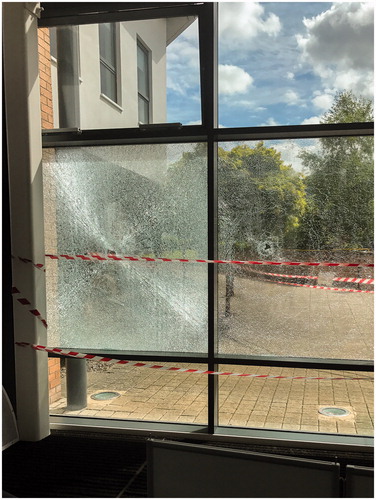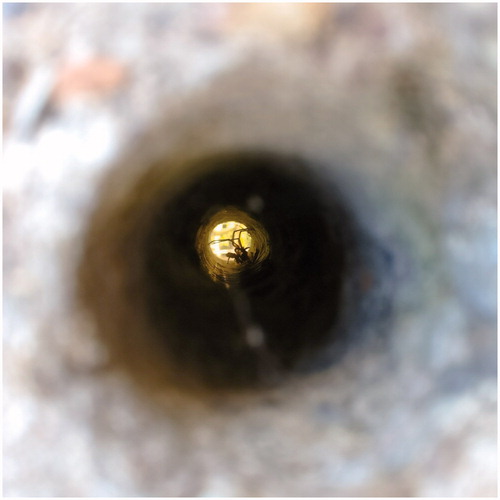Abstract
This essay examines two materials found on the walls of a British psychiatric hospital: shatter-proof glass and steel-reinforced concrete. Interested in their constitution through and of the institutional space, it explores these common building materials’ capacities to tolerate as well as to hold and contain. In doing so, the essay contemplates visually and textually where institutional space and practices begin and are bounded. The authors’ own voices enter in an epilogue, reflecting on their role in facilitating and testing the tolerance of institutional spaces. In doing so, they point towards architectural features in which these walls and their particular forms of boundaries between the inside and the outside of the psychiatric institution are constitutive of spaces of tolerance: they contain and regulate the users of the spaces (staff, patients, visitors as well as researchers). The tolerance articulates as selective yielding and holding.
“Someone got angry,” the staff member said to me laconically. It is not long after the event and the sun is struggling to get through the granulated safety glass partition, still holding together, not broken, but crumbled into small granular chunks … an angry person threw a pot, not just once but twice, the pot shattered one glass partition and made a hole in the other … no splintering shards causing injury but a change of atmosphere … a loud noise, a splintering, maybe a scream, then quiet, staff approaches, the person is taken away, the pots too – “we don’t want any copy cats”; someone sealed off the space with red-and-white striped plastic tape while someone else has already ordered new glass panes. The next morning all is quiet again. The stripy tape and the spider-webbed safety glass a timely reminder of this place, relaxed and alert like a cat in less than a second’s time, like the tempered glass with its interior in tension, from one moment to the next it buckles when hit, a situation alters, the atmosphere changes, millions of small pieces, one throw. The glass flexes, gives and makes way to the impact, retreats, splinters, yet doesn’t fall apart. However, in one place, the panel is broken: the impact too strong, the tension too much. The panels release tension into a rupture, shattering glass on the immediate outside – as if to yield with highly controlled tolerance.
The boundary of the hospital is demarcated by its original stone walls from the 1840s, altered and modified, opened up and broken through to make way for new entrances, additions. Some of these are later closed off again. Some of the walls have crumbled over the years and needed replacement, reinforcement. Clearly, crumbling was not considered a suitable form of institutional yielding for the perimeter wall. The reinforcement arrives in the form of concrete slabs. The replacement of the old stone wall with concrete slabs presents an architectural, structural innovation akin to the shatter-proof glass. Differently to the glass though, the concrete innovates in so far as the timescale for decay is vastly extended compared with the stone wall and its cement. And, still, it yields, as we can observe in places where the steel rods become exposed, on some of the surfaces too. We find, too, another resonance between the shattered glass panel and the concrete wall: the concrete features drill holes from one side to the other, in regular intervals and patterns. We (and editors) speculate these to be leftovers from the formwork, purposeful only for a different usage to the one that we encounter. Yet, they offer us an effect we also encounter in the shatter-proof yet ruptured glass: an opening from one side to the other. The shatter-proof glass buckles, splinters, holds together yet in turn occludes what was previously a clear view to the outside. A seeming continuity between the inside of the psychiatric hospital to its outsides, the drill hole offers to the eyes a look-out, beyond the wall. A space of tolerance making it possible for the gaze to transgress the wall. Its limitations are at the same time also clear: to look beyond we need to crouch down, press our eye close to the wall, and in the process, we discover the hole’s occupant, a spider.
***
Gesa Helms (GH): Can we go back to your initial conversation?
You described it as “laconically” … as if to calmly, coolly pat things down, smooth them.
Ebba Högström (EH): I read earlier that yielding also means soft
… smooth.
GH: Ah, that makes it soft to the touch, doesn’t it? And helps us understand the relationship between yielding and holding a little bit better: to hold something in your hand, the hand sinks a little, yields, comes to a rest, the object, person, circumstance, held.
EH: That is curious: that renders the materials rather tactile too, engaged with at close range; while at the same time much of that institutional response seems intent on containment: to yield a little but never crumble.
GH: And then there is this highly visible rupture, a witness to someone having gotten angry – not in their room, not on their ward but at the main entrance of the hospital. Here, now, today over lunch, you and I keep going back to that incident. By doing so, aren’t we not also breaking the containment?
EH: You mean in terms of our roles, my role, the agreements and arrangements that we have with this research project.
GH: Yes? Do we need permission?
EH: I have permission: to take photos that don’t contain people. But, yes, this, here, documents their practice, an interaction, an event. And in a way we are keeping transgressing. Are we too testing tolerance?
GH: We are very literally, by means of a camera and by means of a print medium copying this incident. Elsewhere, on a different register, but nonetheless. This here turns you and I into copy cats.
EH: Or, rather: we stretch the definition of yielding and holding. We necessarily do so as we move outside the institutional context.
Acknowledgements
The authors thank the management of Gartnavel Royal Hospital, Glasgow, UK, for making this research project possible, especially the reference group. They also thank all the participants of the project, many of them staff and patients at the hospital.
Additional information
Funding
Notes on contributors
Ebba Högström
Ebba Högström is a researcher, educator and architect working in the intersection between geography, planning and architecture. Her research interest concerns how built environments and landscapes are spatially and materially configured, used, and experienced in relation to visions and plans. She is particularly interested in institutional geographies, and (auto-)ethnographic approaches for experiencing, analyzing and representing space. As a Marie Curie Research Fellow at the School for Geographical and Earth Sciences, University of Glasgow, she worked with the research project GART-PSYC Psychiatric Spaces in Transition: Discourse, Dwelling, Doing. Currently, a senior lecturer at the Swedish School of Planning at Blekinge Institute of Technology, she runs the Master’s Program in Urban Planning.
Gesa Helms
Gesa Helms is an artist, researcher and educator, and a human geographer by training (Universities of Göttingen, Germany, and Glasgow, UK). Her current (artistic) research as practice combines (auto-)ethnographic approaches (in lens-based, social, textual, performative and visual media) with facilitation in group and one-to-one settings and is in the production of both public and private spaces. She is currently an Honorary Research Fellow of the School for Geographical and Earth Sciences, University of Glasgow.


